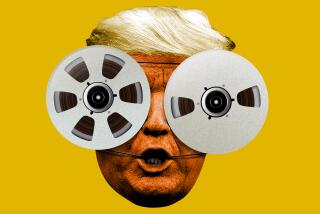No Fair! You Always Get the Database! : THE ZERO HOUR.<i> By Joseph Finder (William Morrow & Co.; $25, 432 pp.)</i>
- Share via
As you read this, somewhere in America 7-year-olds on summer vacation are acting out a time-honored childhood ritual: pretending to shoot each other. But as any kid knows, before you can pull the trigger, you have to choose your weapons.
In the 1930s, when America was plagued by mobsters, the scene went something like this:
Kid One: I get the tommy gun, you have to use the six-shooter.
Kid Two: No fair! You always get the tommy gun! Let me pick first!
In the 1950s and ‘60s, when America was terrorized by Russians, the scene was updated:
Kid One: I get the H-bomb, you have to use the A-bomb.
Kid Two: ‘o way! You always get the H-bomb!
And now that terrorism has replaced the Cold War as Public Enemy No. 1, kids everywhere are standing around, confused.
“What weapon is the government using against these cold-blooded killers?” they ask. Is it a nuclear submarine? Is it the Patriot missile? Is it a satellite laser?
Nope.
CIA expert Joseph Finder has written a novel about a Wall Street raider who avoids SEC prosecution by escaping to Switzerland. He harbors such a grudge against the people who tried to put him away that he pays Zero, a notorious terrorist, to blow up Wall Street. The FBI is trying to catch the terrorist before his bombs go off.
The book is very thoroughly researched, and the author never lets you forget it. He presents all the acronyms of all the worldwide terrorist organizations. He explains emerging fingerprint technology and how to trace cellular phone calls. There’s a short briefing on voice cryptography.
The Oklahoma City and World Trade Center bombings were both pulled off by unsophisticated ideologues who didn’t cover their tracks very well. If mere amateurs could cause so much damage, imagine what a top-notch terrorist could do. What if, for once, a terrorist didn’t try to save money by renting a stolen truck and just blew up his own truck? Would we have any chance of catching him?
Well, yes. Because the good guys have a secret weapon, which is . . . a computer database. I’m not kidding. Apparently, these databases are so sophisticated that all an FBI agent has to do any more is to sit at her desk, drink a lot of coffee and wait for the computer to decipher a clue. The old days of actually leaving the office are gone.
When Zero breaks out of prison, he goes into a database of “recent terrorists who broke out of prison.” That’s not a very big database, so the FBI figures out very soon whom they’re up against.
Then Zero’s backer makes a cell-phone call with an encryption scheme that isn’t in the encryption database--red flag! When Zero enters the country with a stolen passport, the INS database is watching. When some plastic explosives are stolen from a manufacturer, that goes into a database too.
And that’s too bad. FBI agents used to be fun to read about, mostly because they had adventures I didn’t: They got into fistfights, sneaked into guarded compounds and occasionally discharged their weapons. Now they sit in meetings, as in this scene from the book:
Heroine: We know the automated, optically scanning document readers at all ports of entry store all information on who’s entered the country . . . and we cross-check that list against a list of all passports reported lost or stolen within the last month . . . and we’ve got him.
Sidekick: As long as I’ve been in the bureau, that’s never been done. These are two separate, discrete databases.
Heroine: They didn’t have Ken Alton, computer wizard.
Sidekick: Don’t get your hopes up, kid.
This could have serious consequences for the entertainment industry. If catching bad guys is not very different from a Dilbert cartoon, what will they make cop shows out of?
Just imagine a scene from “NYPD Blue,” circa 2001:
Jimmy Smits: Looks like somebody bought it. Any clues?
Dennis Franz: Yup. We found some DNA on the doorknob, fed it into the database, found a match. Got his home address out of another database and a patrol car is on the way to pick him up.
Smits: Just great. Now what are we supposed to do for the next 41 minutes of air time?
The implications for “The Zero Hour” are that the heroine doesn’t get to do anything heroic, and so we don’t really relate to her--we’re not right there in those meetings with her, rooting for her to stop searching the CIA database and try out the NSA database.
Finder seemed to recognize the limits of his material. To make the book exciting, he devoted about half the scenes to the terrorist. Zero gets $10 million a job.
Also, he wears Vittadini suits and can talk about architecture for hours. He’s sort of the James Bond of terrorism, and we might think he was cool if every 20 pages or so he didn’t wring someone’s neck.
The book is easy to put down, but it’s easy to pick up again. If you read it on the beach, you won’t have to worry about it haunting your dreams or keeping you from your appointed windsurfing lesson.
There’s going to be a movie made from the book--20th Century Fox paid seven figures for the rights--and I can just imagine the meetings they are having to cast the roles:
Star one: I get to be the terrorist, you have to be the FBI agent.
Star two: No fair! You always get to be the terrorist, let me pick first!
“The Zero Hour” is available on two audiocassettes from Brilliance/Nova for $16.95; abridged.

